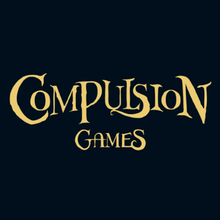Compulsion Games
 | |
| Subsidiary | |
| Industry | Video game industry |
| Founded | 2009 |
| Founder | Guillaume Provost |
| Headquarters | Montreal, Quebec, Canada |
Key people |
Guillaume Provost Whitney Clayton |
| Products |
Contrast We Happy Few |
| Parent |
Microsoft Studios (2018–present) |
| Website |
compulsiongames |
Compulsion Games Inc. is a Canadian video game development company known for Contrast and We Happy Few. Its headquarters are located in an old gramophone factory[1] in Montreal, Quebec, Canada. In 2018, it was acquired by Microsoft.
History
Compulsion Games was founded in 2009 by Guillaume Provost;[2] previously he had worked for companies such as Arkane Studios in France.
Provost decided to start his own business and recruited within an old gramophone factory a team including Alex Epstein (narrative director) and Whitney Clayton (art director). The team's previous experiences range from working with Valve on The Orange Box to Ubisoft with Far Cry 3. To raise money for Contrast, their first game, the team worked on projects such as Darksiders, Dungeons & Dragons: Daggerdale, Bagelburg: The Bagelening, and even Arthur Christmas: Elf Run for iOS.[3]
At E3 2018, Microsoft announced they entered into an agreement to acquire Compulsion Games.[4]
Games
The team has produced two games, Contrast and We Happy Few.
Contrast (2013)
Contrast was a PlayStation 4 launch title. The central theme of the title is the care for children.[5] The title is a twilight adventure suspended in Belle Époque magics and Art Nouveau aesthetics, with film noir atmosphere and haunting soundtrack (Shadow Music: A Soundtrack to Contrast). Contrast is set in the 1920s, blending influences from the 1920s Burlesque and Vaudeville era with some more classic film-noir elements from the 1940s.[6] The player controls Dawn, the imaginary friend of a little girl, Didi, who has the power to turn into her own shadow. She can do this any time, provided there is a lit area where Dawn's shadow can be seen. The original gameplay is based on the interplay of shadows and lights; Dawn has the ability to transit from the colorful 3D world of the streets of Paris into the two-dimensional world of shadows, flattening herself on the walls of buildings or rooms. The player can face unusual 2D platform levels, provided the presence of favorable sources of light that can be moved to solve the puzzles. Provost worked with Valve around the time that the original video game Portal was released, and was inspired by how the Portal series encouraged people to think about space in different ways. The idea of 2D shadow/3D world interaction came to him in a coffee shop in France, and seemed to be a great way of exploring new puzzle mechanics. The film noir world, and the narrative, flowed from this concept.[3]
We Happy Few (2018)
We Happy Few is a "cheerful" dystopia set in a fictional English city, Wellington Wells, which is inspired by the psychedelic London of the '60s. It is about a retrofuturistic-fashioned society formed following an alternate timeline of events within World War II, which is on the verge of collapse in the mid-1960s. The residents of the city, seeking to forget an unspeakable horror they committed, began taking a hallucinogenic drug called "Joy" that makes them happy, but also leaves them easily controlled and lacking morality and understanding of anything else. Players will control one of three characters in the full release, who becomes dubbed as a "Downer" after choosing to stop using Joy, and must try to survive long enough to complete something important and personal to themselves, all while trying to escape the city before the impending social collapse. Played from a first-person perspective, the game combines role-playing, survival, and light roguelike elements, with the developers focusing on creating a story with strong narratives, gameplay underlined by a sense of paranoia, and decisions having moral gray areas and weight that influence and affect later parts of the game. This peculiar mix of laughter and dystopia, another "contrast" after the lights and shadows of the previous title, is inspired by the film Brazil by Terry Gilliam, in turn inspired by the quintessential dystopian novel, George Orwell's Nineteen Eighty-Four. In the first trailers, traces of Stanley Kubrick's film A Clockwork Orange can be recognized.[7] The aesthetic style resembles BioShock Infinite because Compulsion Games seems particularly linked to the Art Deco style, also present in Contrast. The world of We Happy Few is procedurally generated.[8] The company filmed a video to present the game to the masses. It explains the lore, reveals some characters, such as Percy and Uncle Jack, and teases the adapted alternate history setting of the game.[9]
Upcoming Title (TBA)
Compulsion Games' third video game will be the first video game developed and published exclusively for the Microsoft Windows and Xbox One platforms ever since the announcement by Phil Spencer the head of Microsoft Studios that Compulsion Games was purchased by the Microsoft Corporation at the 2018 Xbox Electronic Entertainment Expo Event in the city of Los Angeles in June 2018.
References
- ↑ "Compulsion Games | Life in 3D | AREA by Autodesk". Area by Autodesk. Retrieved 2018-08-09.
- ↑ "Guillaume Provost Linkedin Profile".
- 1 2 "Interview: Compulsion Games On Contrast, An Intriguing Game Of Light And Shadow - #egmr". #egmr. 2013-01-28. Retrieved 2016-11-23.
- ↑ "Microsoft Game Studios just added five new studios including Ninja Theory". June 10, 2018. Archived from the original on June 10, 2018. Retrieved June 10, 2018.
- ↑ "About Us | Compulsion Games". Compulsion Games. Retrieved 2016-11-22.
- ↑ "Contrast Preview: Diving In And Out Of Shadows". Game Informer. Retrieved 2016-11-23.
- ↑ "Interview With Alex Epstein, Narrative Director at Compulsion Games". Inside the Rift. Retrieved 2016-11-22.
- ↑ "GDC Vault - You-Look-Smashing-Procedural-Art".
- ↑ Hage, Zack (2015-12-29). "Why We Happy Few is the Most Promising Game of 2016 – The Cube". Medium. Retrieved 2016-11-23.